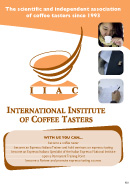World Report
Photovoltaic Espresso for Caffè Pascucci
Caffè Pascucci has recently presented a coffee bar kiosk running exclusively on photovoltaic panels. The coffee machine, the coffee grinder and the dishwasher actually use electricity produced by the panels fitted on the roof of the kiosk. “The idea comes from the hundreds of coffee bars on the beach in Rimini – using the words of Mario Pascucci, owner of the name-sake roasting company – Together with Marco Cuccioli, electro-mechanic entrepreneur, we developed a solution which, with an investment of a few thousands of euros, guarantees a remarkable energy saving and is environmentally friendly”. Caffè Pascucci is based in Marche region (Italy) and apart from supplying the HoReCa channel, has a chain of more than 100 coffee bars with its own brand all around the world – of which 42 in South Chorea. The next shop will be opened in the Red Square in Moscow.
Italy: 6 billion doses at vending machines
Consumption from vending machines in Italy is around 6 billion doses. With 1,731,000 machines in Italy, the sector has a turnover above €2 billions and has 30,000 employees. The number of machines at the workplace and in public places has more than doubled in 5 yeas, increasing from, roughly, 700.000 machines in 2000 to more than 1,700,000 in 2005. This increase is mainly due to the fact that, over the last few years, there has been a genuine boom of the number of public vending machines for offices. Italians are passionate for coffee. Coffee vending machines are almost 70% of the market of vending machines, with approximately 4 billion consumptions, of which 2 billions of coffee in beans and more than 1 billion of single-dose coffee.
Twice as much sustainable coffee for Sara Lee
Sara Lee, third buyer of coffee in the world and owner of the brands Douwe Egberts, Merrild, Maison du Café and Marcilla, has announced that it is buying twice as much of sustainable coffee. This will lead Sara Lee to processing 20,000 tons of it in 2008 (in 2004: 2,500 tons). “As a global coffee roaster, Sara Lee can emphasise sustainability as an environmentally and local community friendly coffee producing method – using the words of Frank van Oers, CEO of the coffee and tee division – The volume of purchase of sustainable coffee will grow in parallel with the growth of the market of the finished product”. The company is a partner to UTZ Certified Foundation.
Coming soon is Plus 4 You by CMA: -30% of energy consumption
CMA presented Plus 4 You, an espresso machine which makes it possible to save 30% of energy compared with a traditional machine. This is important for both the environment and the barista. Calculations show that the average annual energy consumption of a machine is around € 1,200. In order to obtain these results, the hydraulic system has been upgraded. The new electronic version makes it possible to have a distribution of power based on the actual needs. The self-command of the machine helps the barista analyse the functioning of each group and plan energy saving. The monitoring of the quality in the cup is remarkable: the machine measures each cup against the optimum parameters for the used blend. In the event of problems, the system points out to the barista the possible causes and suggests potential solutions.
The new Caffè River calendar: Arezzo calls New York
The new 2008 calendar by Caffè River from Arezzo is ready. The pictures of this edition have been taken by Giovanni Santi, who gives an insight in New York showing its defining locations: Times Square, Lower Manhattan, East Village, Hudson River, Empire State Building and Ground Zero. A compact disorder of floors and windows with varying perspectives, light-and-shadow effects, uncommon pictures with sights and fragments of a city with thousands of facets.

